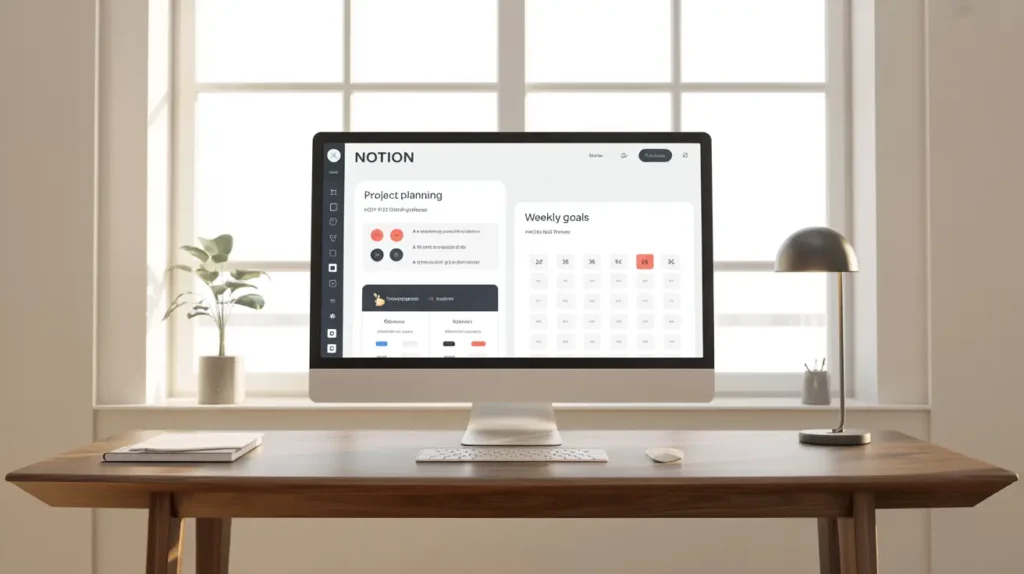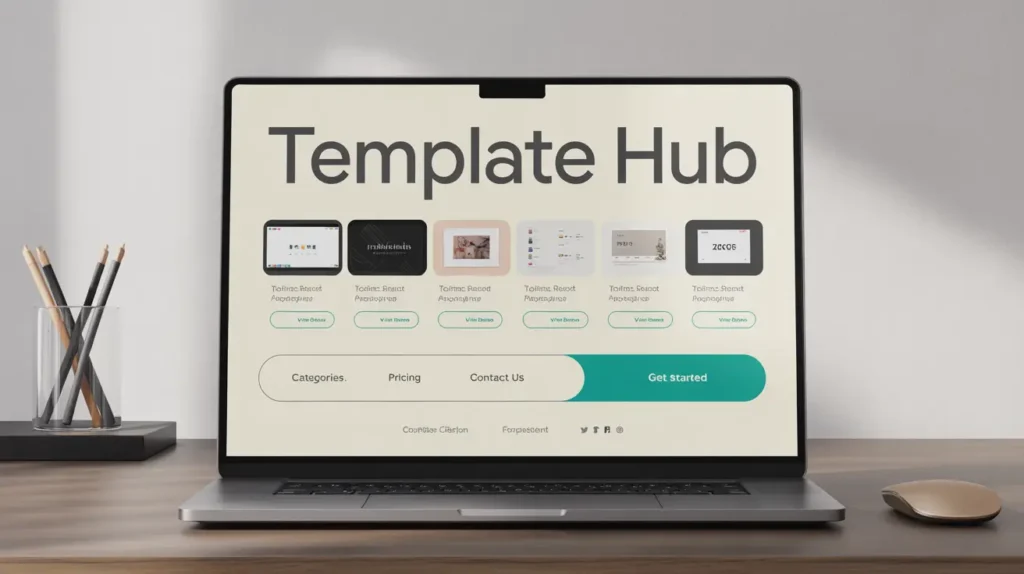Can a simple productivity tool generate millions in revenue? The answer lies in the rising popularity of Notion and its customizable templates.
With approximately 100 million users as of 2024, Notion has become a go-to platform for individuals and businesses seeking to streamline their workflow and enhance productivity. Creators like Thomas Frank have earned up to $1 million by selling their templates, while others, like Easlo, made $239,000 in a single year.
This comprehensive guide will walk you through the process of creating, marketing, and selling your own Notion templates, helping you tap into this lucrative market and potentially turn your side hustle into a sustainable business.
Key Takeaways
- Create customizable templates that cater to various niches and customer needs.
- Utilize platforms like Gumroad to sell your templates and reach a broader audience.
- Understand the value proposition of your templates to command premium prices.
- Leverage the digital product nature of Notion templates to generate passive income.
- Explore the official Notion Marketplace and third-party platforms to determine the best sales channels.
Why Selling Notion Templates Is a Profitable Business Opportunity
The market for Notion templates is booming, presenting a lucrative opportunity for creators to monetize their productivity tools. As the popularity of Notion continues to grow, so does the demand for high-quality templates that can help users maximize the platform’s potential.
The Growing Demand for Notion Templates
The demand for Notion templates is on the rise as more users discover the benefits of using customizable templates to streamline their workflows. Successful creators are capitalizing on this trend by developing and selling templates that cater to various needs, from project management to personal productivity.

Many users are willing to pay for well-designed templates that save them time and improve their productivity. This growing demand presents a significant opportunity for creators to sell their Notion templates and build a profitable business.
Potential Earnings from Selling Templates
Top creators in the Notion community have achieved remarkable success by selling their templates. For instance, Thomas Frank has earned up to $1 million from his template sales, while Easlo generated $239,000 in a single year. To make sure you’re creating products that sell, it’s essential to understand what users are looking for and design your templates accordingly.
By developing a portfolio of high-quality Notion templates and effectively marketing them, creators can tap into this lucrative market and achieve significant earnings. The key to success lies in creating diverse products that appeal to a broad customer base and continually adapting to the evolving needs of Notion users.
Understanding Notion Templates and Their Value
By providing pre-designed structures, Notion templates save users a significant amount of time and effort, which they can then allocate to their business and personal lives.

What Are Notion Templates?
Notion templates are pre-designed pages or databases that help users get started with organizing their tasks, projects, and notes in a structured way. A Notion template is essentially a blueprint that can be customized to fit individual needs, making it easier to manage information and workflows.
Types of Templates That Sell Well
Various types of templates are in high demand, including project management templates, habit trackers, meeting notes templates, and customer relationship management (CRM) templates. These templates cater to different needs and are popular among individuals and businesses looking to streamline their operations.
Why People Buy Notion Templates
People buy Notion templates for several reasons. The primary motivation is time savings, as users avoid spending hours designing and testing systems from scratch. Additionally, templates offer inspiration and best practices that help users discover new ways to organize information and optimize their productivity. Businesses purchase templates to standardize processes and ensure consistent workflows across teams.
Getting Started: Creating Sellable Notion Templates
Creating a sellable Notion template requires a blend of functionality, aesthetics, and user-centric design. To start, you need to understand what makes a Notion template valuable and appealing to potential buyers.
Researching Market Demand and Competition
Before diving into creating your Notion template, it’s crucial to research the market demand and competition. Identify popular categories and types of templates that are currently in demand. Analyze the features, pricing, and customer reviews of existing templates to understand what works and what doesn’t. This research will help you identify gaps in the market and opportunities to create something unique and valuable.
Some key areas to focus on during your research include:
- Popular template categories on Notion and other marketplaces
- Features and functionalities that are highly rated by users
- Pricing strategies used by successful template creators
- Gaps in the market that your template can fill
Designing User-Friendly Templates
Designing a user-friendly Notion template is crucial for its success. Your template should be intuitive, easy to navigate, and provide clear instructions for use. To achieve this, focus on creating a clean and organized layout, using clear and concise language in your instructions, and ensuring that your template is fully functional and free of bugs.
To make sure your template is user-friendly, consider the following:
- Use a clean and minimalistic design that is easy on the eyes
- Provide detailed documentation and support resources
- Ensure that your template is compatible with different Notion plans and versions
Testing and Refining Your Templates
Once you’ve created your Notion template, it’s essential to test it thoroughly to ensure it works as expected. Testing involves checking for bugs, usability issues, and performance problems. You should also gather feedback from a diverse group of users to identify areas for improvement.
Some key steps in the testing process include:
- Thoroughly testing your template with various use cases and scenarios
- Recruiting beta users to provide feedback on functionality and user experience
- Creating a systematic testing checklist to ensure all features are covered
- Paying special attention to performance with substantial amounts of content
By following these steps and continually refining your template based on user feedback, you can create a high-quality Notion template that meets the needs of your target audience and stands out in the market.
Preparing Your Templates for Sale
Preparing your Notion templates for sale is a crucial step in ensuring they are attractive to potential buyers. This process involves several key aspects that can significantly impact the success of your templates.
Clear Instructions and Documentation
One of the most important aspects of preparing your Notion templates is creating clear instructions and documentation. This helps users understand how to effectively use your templates, reducing potential frustration and support requests. By providing comprehensive guides, you can enhance the user experience and increase the perceived value of your templates.
Adding Visual Appeal
The visual appeal of your Notion templates plays a significant role in attracting buyers. Ensure that your templates are well-designed, visually appealing, and align with the expectations of your target audience. Using high-quality images and a consistent design theme can make your templates more attractive and professional.
Pricing Strategies
Determining the right price for your Notion templates is crucial for their success. Research competitor price points to establish a baseline, considering factors like complexity and niche specificity. You may also want to implement tiered pricing strategies or offer bundles at discounted rates to capture different market segments and increase average order value.
- Research competitor pricing to establish a baseline.
- Consider tiered pricing strategies for different market segments.
- Price templates based on the value they provide to users.
- Test different price points to maximize sales volume and revenue.
By carefully preparing your Notion templates for sale, you can increase their appeal to potential buyers and set your business up for success in the competitive market of digital products.
Sell Notion Templates on the Official Notion Marketplace

The Notion Marketplace offers a unique opportunity for creators to sell their templates to a targeted audience. By listing your templates on this platform, you can reach users who are actively looking for productivity solutions.
Setting Up Your Creator Profile
To start selling on the Notion Marketplace, you need to set up your creator profile. This involves providing basic information about yourself and your creations. Ensure that your profile is complete and professional, as it will be visible to potential customers.
Getting Verified for Payments
Notion requires creators to get verified for payments to receive earnings from template sales. This process involves linking your Stripe account to Notion, allowing for secure and efficient transactions. Be aware that Notion is the merchant of record and handles payment processing, including tax collection.
Submitting and Managing Your Templates
Once your profile is set up and you’re verified for payments, you can start submitting your templates. Ensure that your templates are high-quality, user-friendly, and comply with Notion’s guidelines. You can manage your template listings, track sales, and update your products as needed through your creator dashboard.
Understanding Notion’s Payment Structure
Notion charges a 10% fee plus $0.40 per transaction for operational costs, including payment processing and support. While Notion handles sales tax and VAT, creators are responsible for reporting and paying income taxes on their earnings. Understand the biweekly payout schedule and the $20 minimum threshold for payments.
Using Gumroad to Sell Your Notion Templates

Gumroad offers a seamless way to sell digital products like Notion templates to a wide audience. With its user-friendly interface and robust marketing features, you can focus on creating and selling your templates.
Setting Up Your Gumroad Store
To start selling your Notion templates on Gumroad, you need to set up your store. This involves creating a profile, adding a profile picture, and customizing your storefront to reflect your brand. Gumroad’s intuitive interface makes it easy to set up your store and start uploading your templates.
Uploading and Pricing Your Templates
Once your store is set up, you can start uploading your Notion templates. Gumroad allows you to set prices for your templates and offers various pricing strategies, including discounts and bundle deals. You can also use Gumroad’s analytics to track sales and understand customer behavior.
Leveraging Gumroad’s Marketing Features
Gumroad offers a range of marketing features that can help you promote your Notion templates. You can use its built-in email marketing tools to nurture relationships with customers and announce new template releases. Additionally, Gumroad’s affiliate program allows you to partner with influencers and other creators to promote your templates for a commission.
Alternative Platforms for Selling Notion Templates
If you’re looking to diversify your sales channels, several alternative platforms can help you reach a broader audience for your Notion templates.
Etsy as a Marketplace for Digital Products
Etsy is known for handmade and vintage items, but it also allows the sale of digital products, including Notion templates. To sell on Etsy, you’ll need to set up a shop, create listings for your templates, and optimize them with relevant keywords.

Specialized Platforms like Notion Everything
Notion Everything is a marketplace dedicated to Notion templates and related products. Selling here can connect you with a targeted audience looking for Notion solutions.

Creating Your Own Website or Storefront
Building your website to sell Notion templates offers complete control over your branding, pricing, and customers experience. This approach allows you to maintain 100% of your revenue, minus payment processing fees, and build direct relationships with your customers.
- Establish your own website or storefront to maintain complete control over your brand identity, customer experience, and marketing strategy for your templates.
- Benefit from keeping 100% of your revenue rather than paying marketplace commissions on each sale.
- Build direct relationships with your customers, collecting valuable email addresses and contact information for future marketing efforts.
By having your own platform, you can establish a long-term business with your unique identity.
Marketing Your Notion Templates Effectively
To successfully market your Notion templates, you need to employ effective strategies that resonate with your target audience. This involves understanding your potential customers and creating a marketing plan that speaks to their needs.
Creating Compelling Product Listings
A well-crafted product listing is crucial for converting browsers into buyers. Ensure that your template’s benefits are clearly outlined, and include high-quality visuals to showcase its features. Use clear and concise language in your product description to make it easy for potential customers to understand the value your template offers.
Using Social Media to Showcase Your Templates
Social media platforms are powerful tools for reaching a wider audience. Share screenshots or videos of your templates in action, and engage with your followers by responding to comments and messages. Utilize relevant hashtags to increase the visibility of your posts and attract new customers.
Building an Email List of Potential Customers
Building an email list allows you to directly communicate with potential and existing customers. To grow your list, create valuable lead magnets such as free mini-templates or Notion guides. Implement email capture forms on your website and social media profiles to continuously grow your subscriber list. You can also segment your list based on customer interests and engagement levels to deliver more targeted communications.
Some effective strategies for email marketing include developing a welcome email sequence, sending regular newsletters with Notion tips and template usage strategies, and using emails to announce new template releases or special offers. It’s also important to track email performance metrics to optimize your strategy over time.
- Create valuable lead magnets to encourage email sign-ups.
- Segment your email list for targeted communications.
- Develop a welcome email sequence to introduce new subscribers to your offerings.
- Send regular newsletters to maintain engagement with your audience.
- Use email to announce new template releases or special promotional offers.
By implementing these strategies, you can effectively marketing your Notion templates and attract more customers.
Creating Video Demonstrations for Your Templates
In today’s digital landscape, video content is key to effectively marketing your Notion templates. By creating high-quality video demonstrations, you can showcase the value of your templates and attract potential customers.
Why Videos Boost Template Sales
Videos can significantly enhance the sales of your Notion templates by providing customers with a clear understanding of how to use them. A well-crafted video demonstration can help potential customers visualize how the template will fit into their workflow, increasing the likelihood of a sale.
Some key benefits of using videos to promote your templates include:
- Improved customer understanding of the template’s features and functionality
- Increased confidence in the template’s value and usability
- Enhanced engagement and conversion rates
Tips for Creating Effective Template Demos
To create effective video demonstrations, keep the following tips in mind:
- Keep your videos concise, ideally 2-3 minutes, to maintain viewer engagement
- Use screen recording software like Loom, Camtasia, or ScreenFlow to capture high-quality footage
- Highlight unique features and clever implementations that differentiate your template
- Include captions or text overlays to emphasize key points and make the video accessible
By following these tips and creating high-quality video demonstrations, you can effectively showcase your Notion templates and attract more customers.
Building a Template Business: Beyond One-Off Sales
As you establish your Notion template business, consider strategies that go beyond one-time sales. To achieve long-term success, it’s crucial to diversify your revenue streams and create ongoing value for your customers.
Creating Template Bundles and Collections
One effective way to increase average sale value is by creating template bundles and collections. By grouping related templates together, you can offer customers a more comprehensive solution, thereby increasing the perceived value and justifying higher prices. This strategy also helps to differentiate your products from those of competitors.
To implement this strategy, identify templates that complement each other and appeal to the same target audience. For instance, you could create a productivity bundle that includes templates for task management, goal setting, and habit tracking.
Offering Template Customization Services
Another way to expand your business is by offering template customization services. Many customers are willing to pay a premium for templates tailored to their specific needs. By providing customization options, you can cater to a wider range of customers and increase revenue.
To offer customization services effectively, you’ll need to develop a process for modifying templates according to client specifications. This may involve creating a form for customers to provide their requirements or offering consultation services to understand their needs.
Developing a Subscription Model for Templates
A subscription model can provide a steady stream of recurring revenue and help to build a loyal customer base. By offering regular updates, new templates, or exclusive content, you can incentivize customers to subscribe to your service.
- Create a tiered subscription structure to appeal to different customer segments.
- Provide exclusive templates or content to subscribers to encourage loyalty.
- Develop a consistent release schedule to maintain subscriber engagement.
By implementing these strategies, you can build a successful and sustainable Notion template business that generates ongoing revenue and provides value to your customers.
Managing Customer Relationships and Feedback
Building strong relationships with your customers is crucial for the success of your Notion template business. This involves not only providing excellent customer support but also engaging with your users to understand their needs and preferences.
Providing Excellent Customer Support
To ensure customer satisfaction, it’s essential to offer timely and helpful support. Respond promptly to customer inquiries, and be respectful in your communications. Avoid distributing or selling your customers’ email addresses, and refrain from sending emails too frequently. Honor any requests from users to stop contacting them to maintain a positive relationship.
Using Feedback to Improve Your Templates
Collecting and incorporating customer feedback is vital for improving your Notion templates. Use this feedback to refine your products, making them more user-friendly and relevant to your audience’s needs. This not only enhances customer satisfaction but also encourages loyalty and positive word-of-mouth.
Building a Community Around Your Templates
Creating a community around your Notion templates can significantly enhance customer engagement and loyalty. To build this community, consider the following strategies:
- Create dedicated spaces for template users to connect, such as Facebook groups or community forums.
- Facilitate knowledge sharing among users by encouraging the exchange of tips and use cases.
- Host regular community events like Q&A sessions or productivity workshops.
- Showcase community members’ template implementations to provide inspiration.
By implementing these strategies, you can foster a positive and supportive environment that benefits both your customers and your business. Regularly engaging with your community and leveraging their insights can also inform your template development roadmap, helping you to identify new opportunities and create more valuable products.
Conclusion: Your Path to Success Selling Notion Templates
The world of Notion templates presents a significant chance for creators to build a successful business. By creating high-quality, user-friendly templates, you can capitalize on the growing demand driven by Notion’s expanding user base of approximately 100 million users.
To start selling Notion templates effectively, it’s crucial to adopt a strategic approach that includes thorough market research, effective marketing strategies, and excellent customer service. Multiple platforms, such as the official Notion Marketplace and Gumroad, offer different advantages for selling your templates.
Building a sustainable business involves diversifying your revenue streams through template bundles, subscriptions, and complementary services. By leveraging social media, email marketing, and video demonstrations, you can effectively promote your Notion templates. This comprehensive guide has provided a roadmap to help you navigate the process, from initial research to building a thriving community, ensuring you’re well on your way to success.
Whether you’re aiming for a side hustle or a full-time venture, selling Notion templates offers a flexible path to generating income while helping others become more productive and organized. With affiliate opportunities available through Notion and Gumroad, you can further enhance your earnings.
FAQ
What are the benefits of selling Notion templates on the official Notion marketplace?
Selling on the Notion marketplace provides access to a built-in audience, streamlined payment processing, and the credibility that comes with being part of the official Notion ecosystem.
How do I price my Notion templates?
Pricing depends on the complexity, value, and demand for your template. Research competitors, consider the time invested in creating the template, and test different price points to find the optimal balance.
Can I sell Notion templates on multiple platforms simultaneously?
Yes, you can sell your Notion templates on various platforms like Gumroad, Etsy, or your own website, in addition to the Notion marketplace. However, be sure to check each platform’s terms and conditions regarding exclusivity.
How do I market my Notion templates to potential buyers?
Effective marketing strategies include creating compelling product listings, leveraging social media, building an email list, and producing video demonstrations to showcase your templates’ value.
What kind of support should I offer to customers who buy my Notion templates?
Providing excellent customer support is crucial. Respond to customer inquiries, offer clear instructions, and be open to feedback to improve your templates and build a positive reputation.
Can I customize Notion templates for clients?
Yes, offering customization services can be a lucrative way to differentiate yourself and provide additional value to customers. This can include tailoring templates to specific business needs or branding.
How do I handle payments and refunds for Notion template sales?
Platforms like Gumroad and the Notion marketplace handle payments and refunds. Understand their policies and terms to ensure a smooth transaction process for your customers.
What are some effective ways to get feedback on my Notion templates?
Encourage customers to provide feedback, engage with your audience on social media, and consider offering incentives for reviews or suggestions to continually improve your templates.



